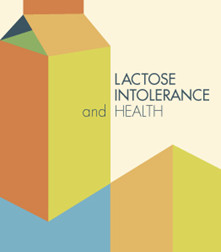Experts aim to form consensus on lactose intolerance and health

Most people know that the term “lactose intolerance” describes an inability to digest significant amounts of lactose, a sugar found in milk and other dairy products. Reduced production of lactase, the enzyme required to successfully digest lactose, can lead to unpleasant digestive symptoms, such as abdominal pain or diarrhea. As a result, those who experience symptoms of lactose intolerance may avoid dairy products and eliminate a crucial component of a healthy diet.
The importance of calcium, vitamin D, and other nutrients found in milk and dairy products to bone health and to overall health are well known. But the true impact of lactose intolerance and the avoidance of dairy products is not. Health care providers are unsure how to counsel patients with lactose intolerance because so many questions remain. Those who believe they have lactose intolerance and those from ethnic groups—Asians, African Americans, Hispanics, Native Americans, Alaska Natives, and Pacific Islanders—in which lactose intolerance is thought to be common are also uncertain how to manage their symptoms and may needlessly avoid dairy products as a result.
So what do we actually know about lactose intolerance and its effects on health?
To review the available scientific evidence about lactose intolerance and health, the NICHD and the NIH Office of Medical Applications of Research are holding a three-day Consensus Development Conference on Lactose Intolerance and Health. At the conference, independent experts will gather to address questions such as:
- What is the prevalence of lactose intolerance?
- How does this prevalence differ by race, ethnicity, and age?
- What are the health outcomes of dairy exclusion diets?
- What amount of daily lactose intake is tolerable for people with diagnosed lactose intolerance?
- What strategies are effective for people with diagnosed lactose intolerance?
- What are the future research needs for understanding and managing lactose intolerance?
Unlike other conferences, which rely on content experts to make recommendations, Consensus Development Conferences are unique in that their recommendations come from an independent and unbiased expert panel. Panel members have no conflicts of interest, or financial or career interests related to the topic. They are highly regarded in their own fields, but are not closely aligned with the subject.
The meeting includes an in-depth presentation of evidence, including a Systematic Literature Review (complete review and synthesis of published information prepared by the Agency for Healthcare Research and Quality) and presentations from recognized experts on the topic. Periods of testimony from the general public and participants are also included. The panel takes all the evidence and information into consideration and prepares and presents a final statement.
Lactose intolerance and its effects on health are highly relevant to the NICHD, which has a broad portfolio in overall growth and development, in bone health and development, and in nutrition. The Institute’s Endocrinology, Nutrition, and Growth (ENG) Branch provides a focus for research and research training in areas including pediatric endocrinology and diabetes, physical growth and body composition, including bone health and obesity, and nutritional science. Other examples of Institute activities on this topic include the following:
- The ENG Branch supports the Bone Mineral Density in Children Study (BMDCS), a population-based longitudinal, observational study of bone accretion in 2,000 healthy children and adolescents ranging from five years to 22 years in age. The Study will provide reference data for monitoring bone health in growing children, providing valuable guidance on maintaining bone health. In addition, the Branch is active in the Federal Working Group on Bone Diseases and supports research on different aspects of bone health and osteoporosis prevention. Please see the ENG Branch, Report to the NACHHD Council, June 2009 for more information.
- The NICHD’s Milk Matters campaign aims to teach parents and other caregivers about the importance of getting enough calcium during the pre-teen and teen years to ensure healthy bones for a lifetime. In addition to a focus on low-fat or fat-free milk and dairy products as sources of calcium, Milk Matters also stresses non-dairy sources of calcium, such as dark green leafy vegetables and calcium-fortified foods, especially for those who experience symptoms of lactose intolerance.
- The Institute supports research on the importance of vitamin D for health. For instance, the ENG Branch funds research on safe and effective levels of vitamin D intake for newborn infants and for women during pregnancy and lactation, with a particular focus on health disparities in the prevalence and impact of vitamin D deficiency in the United States. Within this context, the NICHD sponsored a meeting on Vitamin D in the 21st Century: Bone and Beyond, in 2003 and has continued exploring this avenue of research as part of the Interagency Working Group on Vitamin D. Please see the ENG Branch, Report to the NACHHD Council, June 2009 for more information.
The final consensus statement from the Lactose Intolerance and Health conference will likely have major implications for public health and will help health care providers and patients make educated evidence-based decisions. For more information, select one of the links below:
- NIH Consensus Development Conference: Lactose Intolerance and Health
- Consensus Development Conference Panel Statement on Lactose Intolerance
- NIH Consensus Development Conference FAQs
- NICHD A-Z Topics
- NICHD: Milk Matters Calcium Education Campaign
- NICHD Milk Matters Campaign: Lactose Intolerance: Information for Health Care Providers
- NICHD Endocrinology, Nutrition, and Growth (ENG) Branch
- ENG Branch, Report to the NACHHD Council, June 2009 (Note: This is a scientific document geared toward an audience of researchers and scientists.)
- NIH MedlinePlus: Lactose Intolerance
Originally Posted: February 22, 2010

 BACK TO TOP
BACK TO TOP